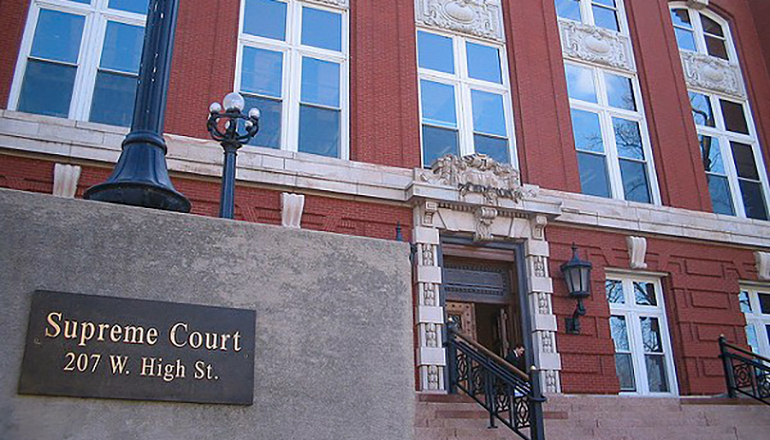(Missouri Independent) – The Missouri Supreme Court heard arguments Wednesday focused on how former Attorney General Eric Schmitt handled a case that pronounced local health authorities’ efforts to mitigate the spread of COVID-19 “null and void” in 2021.
Attorney Neal Perryman represented two counties and three health centers who argued Wednesday that they should have been able to intervene in the original Cole-County case after the attorney general refused to file an appeal.
Deputy Solicitor General Maria Lanahan disagreed, saying the local governmental agencies can’t intervene post-judgment and don’t have a vested interest in the original case.
“(Appellants) have no right in coming in and trying to take the attorney general’s job in determining what is in the state’s interest,” Lanahan told the court.
Perryman said the county is set up, by state statute, to participate in health orders but has lost that power thanks to the original ruling in Cole County.
“We lost a significant part of our authority to issue orders,” he said. “We can’t do what we used to be able to do.”
Case background
In November 2021, Cole County Circuit Court Judge Daniel Green declared local health authorities’ COVID-19 mandates violated the Missouri Constitution.
Perryman said Wednesday that the judge’s ruling came “out of the blue” and local officials were “confident, based on the summary judgment papers, there would be an appeal.”
But while the Department of Health and Senior Services wanted to appeal the case, Schmitt — who resigned as attorney general last year to take a seat in the U.S. Senate — refused.
Chuck Hatfield, who served in the attorney general’s office under Democrat Jay Nixon, previously told The Independent it is “extremely unusual” for the attorney general’s office to oppose a client’s order.
After Schmitt announced he wouldn’t appeal the decision, St. Louis County, Jackson County, Cooper County Public Health Center administrator Melanie Hutton, the Livingston County Health Center board of trustees and the Jefferson County Health Center board of trustees attempted to take the case into their own hands and away from the attorney general’s office.
But Green did not allow them to file a motion for a new trial or to appeal the judgment.
The issue has now found its way to the Missouri Supreme Court, which will decide if the counties have a right to intervene.
Fifteen days after Judge Green struck down local COVID orders as unconstitutional, Schmitt sent threatening letters to school districts and local public health agencies ordering them to cease all COVID mitigation policies.
“All mask mandates, quarantine orders, and other public health orders that are based on any of the invalidated regulations or issued outside the protections of the Missouri Administrative Procedure Act are null and void,” his letter said.
In court Wednesday and in their 67-page filing, the local government agencies seeking to intervene in the case argued that instead of filing an appeal, Schmitt “immediately weaponized the judgment against local governments and schools across the state.”
In May, a Jackson County judge ruled that Schmitt lacked authority to tell school districts to end mask mandates. Perryman said the Jackson County ruling describes the “chaos caused throughout the state” as a result of local health orders being nullified by Judge Green.
The Cole County ruling extended beyond COVID-19 as local health authorities questioned whether it undermined their authority to deal with other potential public health issues, such as outbreaks of RSV.
Perryman said the state has provided no clarity.
Arguments
Judges’ questions Wednesday morning revolved around whether the procedure permits post-judgment intervention. Ordinarily, parties file to enter a case before a ruling is issued.
Perryman told the court that the counties didn’t have a reason to intervene until after Schmitt refused to appeal.
Mathis countered that “motions to intervene are not post-trial motions.”
Judge Patricia Breckenridge, who asked the majority of questions Wednesday, inquired whether “substantial justice” changes procedure. Substantial justice refers to the fairness of a case; sometimes, judges will relax their procedural requirements to provide what they consider to be a fair trial.
Mathis said substantial justice hasn’t been a determining factor for post-judgment intervention in this court.
“How must the court handle a case like this where the state wasn’t defending the state adequately?” Breckenridge asked, saying the attorney general’s office “ambiguously defended” DHSS rules.
Breckenridge also acknowledged the case’s widespread effect, asking Perryman if there was another way to litigate against Green’s ruling.
“So if you aren’t able to intervene,” she said, “there is no way to undo the impact on everyone who is not part of the suit as to the effect of the judgment of this case?”
Perryman said options would be severely limited or nonexistent because the regulations at the heart of the case are no longer in place.
(Photo courtesy of FLICKR – David Shane, licensed under creative commons)


